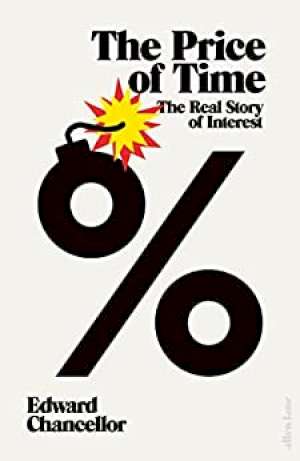23 November 2022
The Price of Time
The Real Story of Interest
Edward Chancellor
2022, Allen Lane, 432 pages,
ISBN 9780241569160
Reviewer: John Shepperd, Butler Toll

This is a fascinating book. It is erudite, insightful, at times amusing and also at times rather irritating. It broadly falls into two parts. Firstly, a comprehensive history of interest rates and by implication a history of monetary policy. It then progresses through more recent experience and ends up as a critique of the ultra-low interest rate policy that we saw in the wake of the financial crash which was perpetuated by the pandemic.
The historical analysis is a product of what clearly is an immense amount of research. Much will be familiar to many readers – the contributions of Cantillon, Bagehot (“John Bull can stand many things, but he cannot stand two per cent”) and Wicksell amongst many others. But I suspect even those who consider themselves well versed in the history of monetary policy might not have realised that it was the Mesopotamians in 2400 BC who came up with the concept of compound interest or that the first bout of quantitative easing was undertaken by Roman Emperor Tiberius in 33 AD when he lent out imperial treasure free of interest.
When it comes to contemporary issues, the key theme is that extremely low interest rates (and the associated quantitative easing) have been a curse that has a lot to answer for. For almost everything that has gone wrong in fact. “Financial repression” results in slow economic growth, creates unstainable bubbles and exacerbates inequality. Indeed, in that it promotes political populism, it represents a threat to the democratic process.
The irritation comes when the usual deeply thoughtful analysis degenerates into a rant. He likens the recent economic environment to the life of the protagonist in the film The Truman Show, who lives an artificial existence as the unwitting star of a TV reality show. In his life, everything is artificial. The comparison is apt, says Chancellor: “As in The Truman Show, we have come to live in a controlled environment, with its fake money, fake interest rates, fake economy, and fake politicians. Our bubble world is sustained by a combination of passive acquiescence and powerful vested interests”.
Perhaps he is a bit more measured when he cites the bizarre world of Lewis Carroll’s Alice in Wonderland where nothing is what it seems and time becomes an illusion. “Carroll would have understood that when the price of time is set at nothing or turns negative, and central banks print money without limit, finance becomes absurd”.
In many ways the analysis might be seen as rather unfashionable at the moment. Nothing “green” in here. Economies need to grow to survive. He pays homage to Hayek’s The Road to Serfdom, published in 1944 but still relevant today, which argued that democracy cannot survive a lowering of living standards or even “prolonged stationariness of its economic conditions”. Essential economic growth results from freely functioning markets where price transmission leads to an efficient allocation of resources. And interest rates are one aspect of this price mechanism – and a key one. Let the markets decide and all will be well and economies will prosper.
Have events passed this book by? Since it was written, the world has changed and many central banks are now in the proactive process of “normalising” interest rates. Only in Asia does much of this critique still obviously apply: in Japan where the ancien régime is still the order of the day; and in China where the “financial repression” has resulted in a housing market bubble that continues to distort the economy.
But there is still a good deal of relevance to other places. The “productivity puzzle” has plagued most advanced economies since the financial crash. The root cause, argues Chancellor, is artificially low interest rates – low interest rates which perpetuate zombie companies. Schumpeter’s creative destruction is an essential part of the system. Quoting former astronaut Frank Borman: “capitalism without bankruptcy is like Christianity without hell”. But it is not just zombie companies – low interest rates lead to wasteful investment which results in correspondingly low returns.
Not many argued that the ill-fated attempt by Truss and Kwarteng to increase growth to a sustainable 2½% via the supply-side boost of lower taxes would be better achieved by having higher interest rates. As interest rates go up in the western economies the results should be more efficient investment, higher productively growth and a trend improvement in overall economic growth. We shall see.
